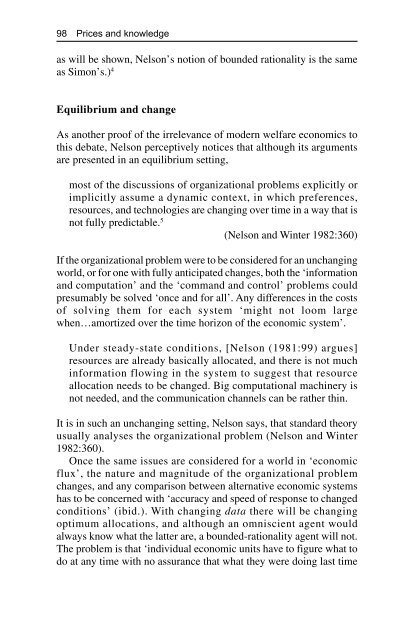Prices and knowledge: A market-process perspective
Prices and knowledge: A market-process perspective
Prices and knowledge: A market-process perspective
You also want an ePaper? Increase the reach of your titles
YUMPU automatically turns print PDFs into web optimized ePapers that Google loves.
98 <strong>Prices</strong> <strong>and</strong> <strong>knowledge</strong>as will be shown, Nelson’s notion of bounded rationality is the sameas Simon’s.) 4Equilibrium <strong>and</strong> changeAs another proof of the irrelevance of modern welfare economics tothis debate, Nelson perceptively notices that although its argumentsare presented in an equilibrium setting,most of the discussions of organizational problems explicitly orimplicitly assume a dynamic context, in which preferences,resources, <strong>and</strong> technologies are changing over time in a way that isnot fully predictable. 5 (Nelson <strong>and</strong> Winter 1982:360)If the organizational problem were to be considered for an unchangingworld, or for one with fully anticipated changes, both the ‘information<strong>and</strong> computation’ <strong>and</strong> the ‘comm<strong>and</strong> <strong>and</strong> control’ problems couldpresumably be solved ‘once <strong>and</strong> for all’. Any differences in the costsof solving them for each system ‘might not loom largewhen…amortized over the time horizon of the economic system’.Under steady-state conditions, [Nelson (1981:99) argues]resources are already basically allocated, <strong>and</strong> there is not muchinformation flowing in the system to suggest that resourceallocation needs to be changed. Big computational machinery isnot needed, <strong>and</strong> the communication channels can be rather thin.It is in such an unchanging setting, Nelson says, that st<strong>and</strong>ard theoryusually analyses the organizational problem (Nelson <strong>and</strong> Winter1982:360).Once the same issues are considered for a world in ‘economicflux’, the nature <strong>and</strong> magnitude of the organizational problemchanges, <strong>and</strong> any comparison between alternative economic systemshas to be concerned with ‘accuracy <strong>and</strong> speed of response to changedconditions’ (ibid.). With changing data there will be changingoptimum allocations, <strong>and</strong> although an omniscient agent wouldalways know what the latter are, a bounded-rationality agent will not.The problem is that ‘individual economic units have to figure what todo at any time with no assurance that what they were doing last time
















